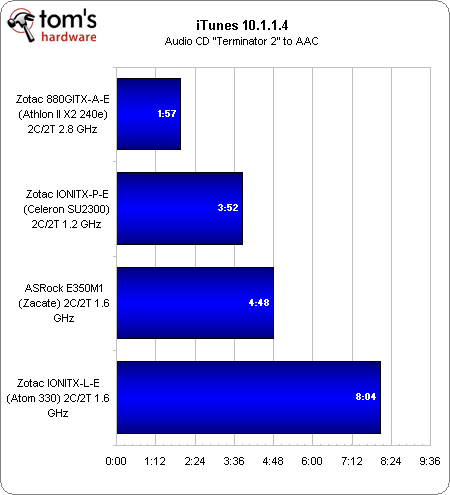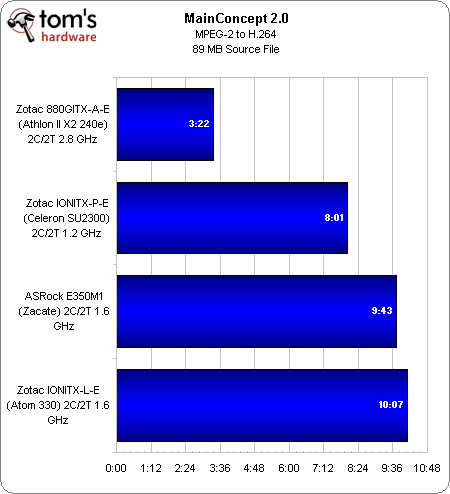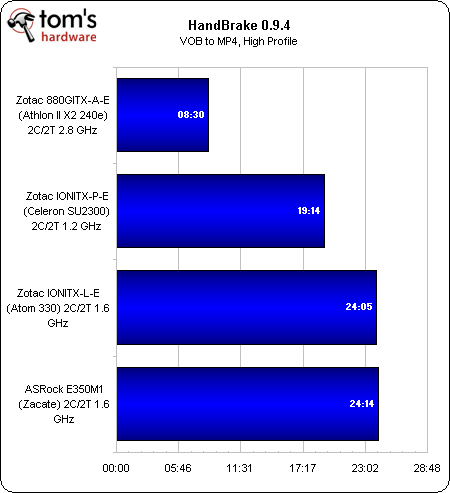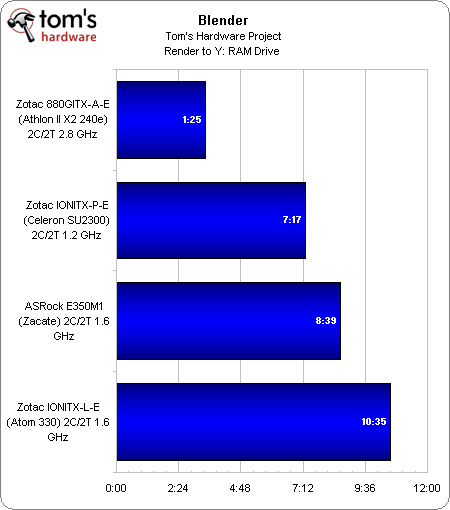ASRock's E350M1: AMD's Brazos Platform Hits The Desktop First
We had the opportunity to preview the Zacate APU late last year at AMD’s headquarters in Austin, Texas. Now we have the first retail motherboard based on the Brazos platform in ASRock’s E350M1. Today we’re asking: what can the Fusion initiative really do?
Benchmark Results: Media Encoding
Not surprisingly, the desktop-class Athlon II, running at 2.8 GHz, finishes this test the fastest. It’s followed by Intel’s 10 W Celeron SU2300. The E-350 takes a third-place spot not far behind, and Intel’s Atom brings up the rear way back there.
Of course, iTunes is single-threaded, so we can see just how badly AMD’s Bobcat core beats Atom on a clock-for-clock basis (we’re talking one 1.6 GHz core per processor here).
It’s probable that most folks aren’t going to push a lightweight system based on E-350, Celeron SU2300, or Atom 330 any harder than an iTunes encode. But we wanted a closer look at threading performance, and MainConcept is able to provide that.
The performance story is indeed much different here, since Atom includes two cores and Hyper-Threading support. Instead of the blowout seen in iTunes, ASRock’s E350M1 is just barely able to scrape by the IONITX-L-E. Then again, remember the Atom board still costs $190 compared to the Brazos platform’s $110 or so. Even if you factor in the benefit of onboard Wi-Fi from Zotac, you’re still getting a lot more performance for your money via Brazos.
Here, Intel’s Atom processor actually manages to sneak past AMD’s E-350. With that said, if you’re doing heavy lifting in HandBrake, it’s likely worth spending money on a separate motherboard and desktop processor, rather than trying to get mobile architectures to do that job. Even the low-power Athlon II is 285% faster than AMD’s E-350.
This really goes without saying, but if you’re expecting to run desktop-class workloads, you shouldn’t show up with a mobile-oriented processor. The Athlon II X2 240e simply mops the floor with the three other contenders here.
Get Tom's Hardware's best news and in-depth reviews, straight to your inbox.
Current page: Benchmark Results: Media Encoding
Prev Page Benchmark Results: Productivity Next Page Power Consumption And Pricing-
iam2thecrowe now they need some devs to take advantage of that apu to see its full potential as a processor.Reply -
Reynod This is an awesome processor ...Reply
Chris ... did you manage to overclock it at all?
Give it your best shot ... call crashman in with the liquid nitrogen if you need to mate !!
Really impressive stats for such a small piece of silicon. -
dogman_1234 So the Brazo is great for media and hard processing I assume. If someone came to me and asked for a good platrom to watch Blu-Ray...I would say get the Brazo APU for them, right?Reply -
sparky2010 Nice, things are starting to look good for AMD, and i hope it stays that way as they start unveiling their mainstream and highend processors, because i'm really fed up with intel dictating crazy prices.....Reply -
cangelini reynodThis is an awesome processor ... Chris ... did you manage to overclock it at all?Give it your best shot ... call crashman in with the liquid nitrogen if you need to mate !!Really impressive stats for such a small piece of silicon.Reply
Didn't get a chance to mess with overclocking. If this is something you guys want to see, I might try to push it a little harder over the weekend. -
joytech22 cangeliniDidn't get a chance to mess with overclocking. If this is something you guys want to see, I might try to push it a little harder over the weekend.Reply
Yeah that would be much appreciated, these little chips are so much faster than Atom, let's see if you can get them to perform similarly to a Dual-Core CPU at 1.8GHz -
cangelini Alright, I'll see what I can do. A shiny new video card landed this afternoon, so that's going to monopolize the bench for much of the weekend ;)Reply -
dEAne Yes integration is the key to higher performance, lower power consumption and lower price (affordability this is what people really wanted).Reply -
haplo602 can you also run gaming benchmarks with a 5670 or similar plugged into the PCIe slot ? Just to have a look how the limited memory interface will bottleneck ...Reply
also what happens with the intgrated graphics core when you plug in a discreet GPU ? you gave so much detail about this in the sandy bridge review but totaly skip it for Fusion ...
the board got me interested. I am trying to buy a small "workstation terminal" ... something to code OpenGL/OpenCL on a budget. Seems this is what I am looking for.




